With their clawed feet, bizarre-looking caruncles, mohawk-like crest, and lack of quack, Muscovy ducks don’t quite fit the “bill” (if you pardon the pun) for what you might consider a “normal” duck. But on our homestead, these are the only ducks we want to keep because they have won our hearts with both their utility and downright personable natures.
After keeping Runners, Cayugas, and Pekins, I’ve become convinced that Muscovy ducks are the perfect homestead duck. Let me share why, and just see if you don’t agree. If you are willing to look past a warty face or two, you may find that these ducks are a wonderful fit for your property as well.
Muscovy Duck Characteristics
Muscovy ducks are a large breed of waterfowl. With their bright red face mask, they stand out from other domesticated ducks almost immediately. The red, rather warty-looking growths are called caruncles — you’ve seen these before on the necks of turkeys if the term seems totally unfamiliar.
Males will often sport what some would call a hideous array of caruncles around their bills, eyes, and even extending down their necks. I think of them as endearingly ugly.
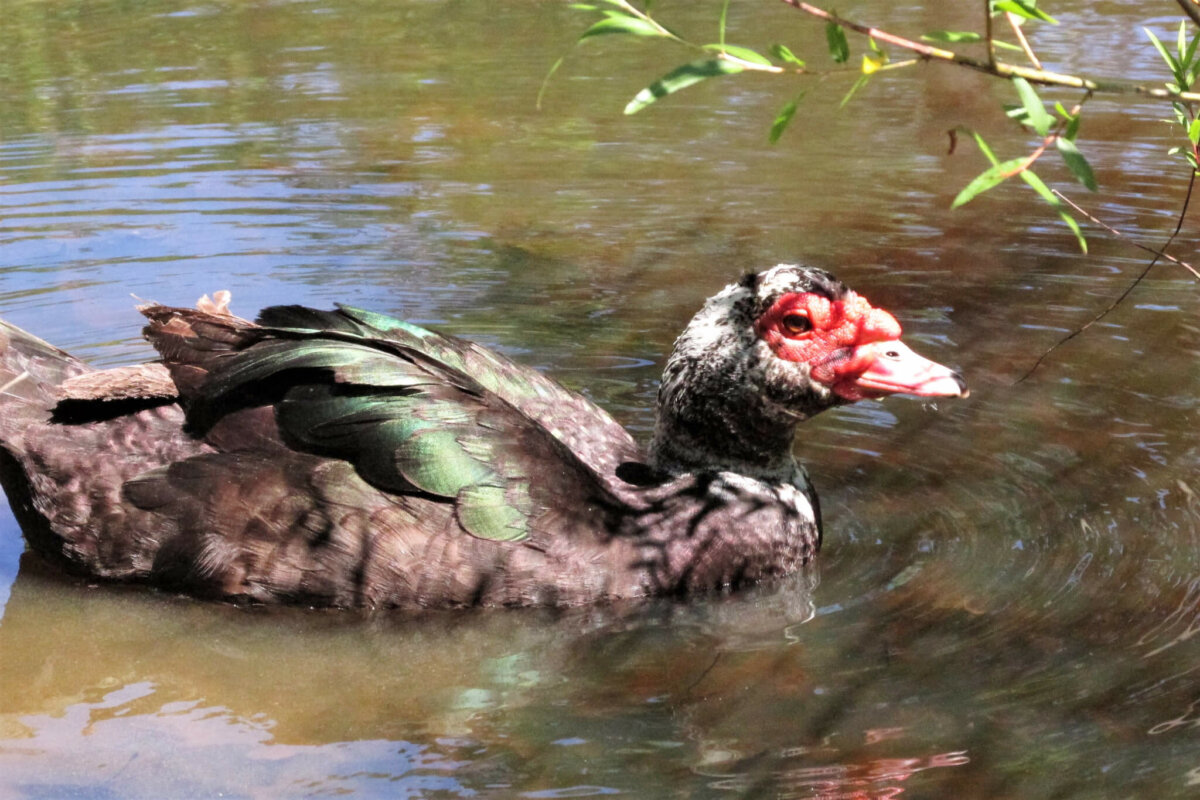
Females are usually a lot more subdued with what looks more like a masquerade mask encircling their eyes. They can come in a wonderfully wide range of colors, like iridescent brown, soft fawn, white, lilac gray, and any color in between.
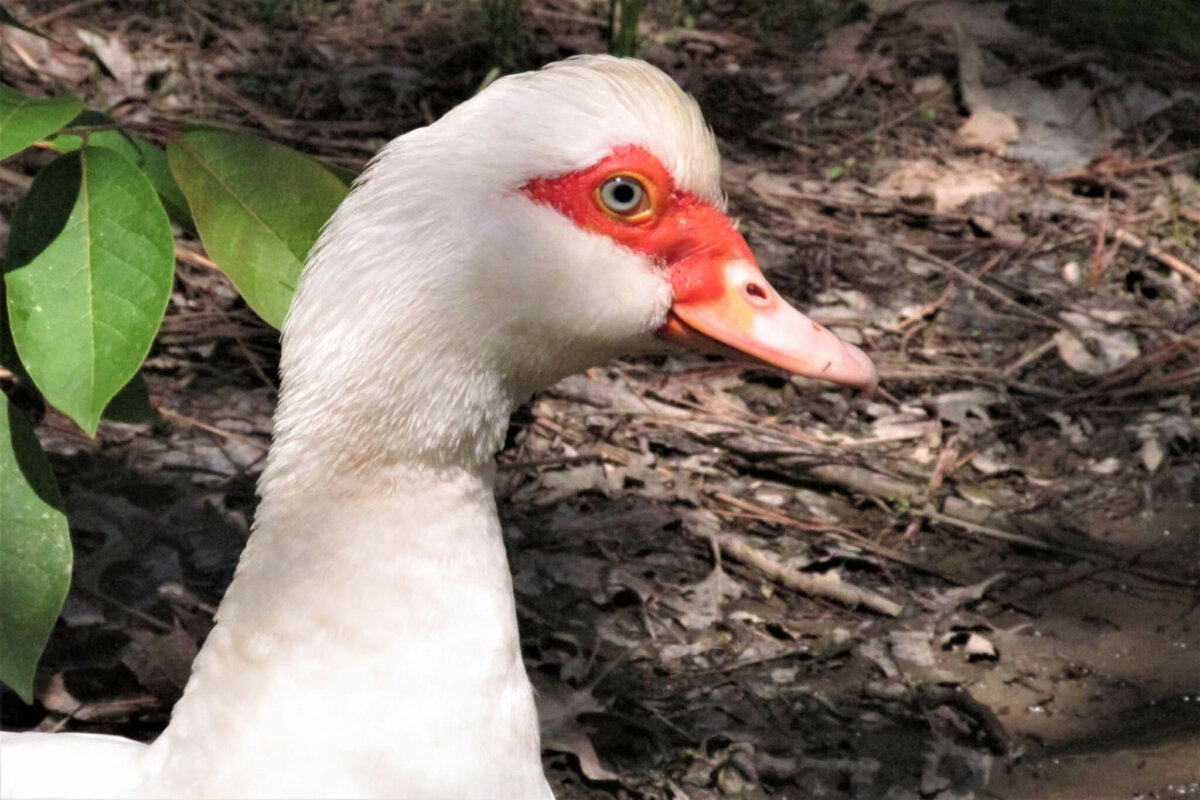
Both sexes can raise an unexpected crest of feathers anytime they are excited by something. The males’ crests are much more pronounced, however. Mature males are huge, usually reaching around 10 to 15 pounds, and as a result, are typically unable to fly. Females are usually half that size at a more petite 5 to 6 pounds and can take to the air as easily as a wild duck.
Related Post: Raising Cayuga Ducks
They also have a back claw on their webbed feet, a unique feature, in the duck world, that allows them to perch on branches (and anything else they are so inclined) like a chicken. If you don’t clip their wings, you’ll find your Muscovy hens hanging out everywhere: the roof, the top of the cars, the edges of buckets, and the branches of trees!
This is something important to keep in mind when handling Muscovy ducks. If they are tame and familiar with you, gently scooping them up around the belly and pinning their wings is no problem. If you’re a stranger to them, however, they may claw at you.
The “Quackless” Duck
Another distinguishing feature with this breed is the sounds they make … or rather, the lack thereof. Though they’re sometimes called “quackless” ducks (and indeed, they are very quiet for waterfowl) the term can be misleading, as they are not silent.
Females usually make a quiet, musical trill when walking about. When broody, they peep and chirp. I think it’s supposed to be intimidating, but it is adorable. The males make somewhat bizarre, heavy-breathing, huffy sounds. When scared, they can honk like a goose, but that’s pretty rare. Usually, you can’t hear these birds unless you’re beside them.
So, if you have nosey neighbors complaining about how you need to mow your lawn-turned-prairie, or saying your beautiful clothesline is an eyesore, at least you can rest easy that they can’t complain about the noises your ducks are making.
Are “Quackless Ducks” Even Ducks?
Technically, not really. These unique waterfowl don’t come from mallard stock as all other domesticated duck breeds do. Their scientific name should tip you off. Muscovies are derived from Cairina moschata, a South American native bird, whereas all other ducks are bred from Anas platyrhynchos, the mallard duck (with the contested exemption of the Cayuga which may have some black duck origins).
Some think they are actually closer in character to a goose than a duck. You can think of it this way: Muscovies are to ducks as donkeys are to horses. They are similar and can crossbreed, but they’re not the same animal.
Related Post: Raising Pekin Ducks
And like donkeys and horses, the mixed offspring of a Muscovy and mallard-domestic duck will be a “mule” that is unable to produce offspring. The mule ducks or mulards, are often used for meat production as they grow quickly and robustly.
Getting Started With Muscovy Ducks
Before you bring your first batch of peeping Muscovy ducklings home, you need to prepare for them. No animal should ever be an impulse buy! Always take the time to set up what they need before you take responsibility for their lives.
When you do make your purchase, be sure to get more than one bird as they are social animals and most content with friends. I recommend getting at least six, just in case you lose a few. A trio or quad of one male to several females is ideal for the small backyard starter flock.
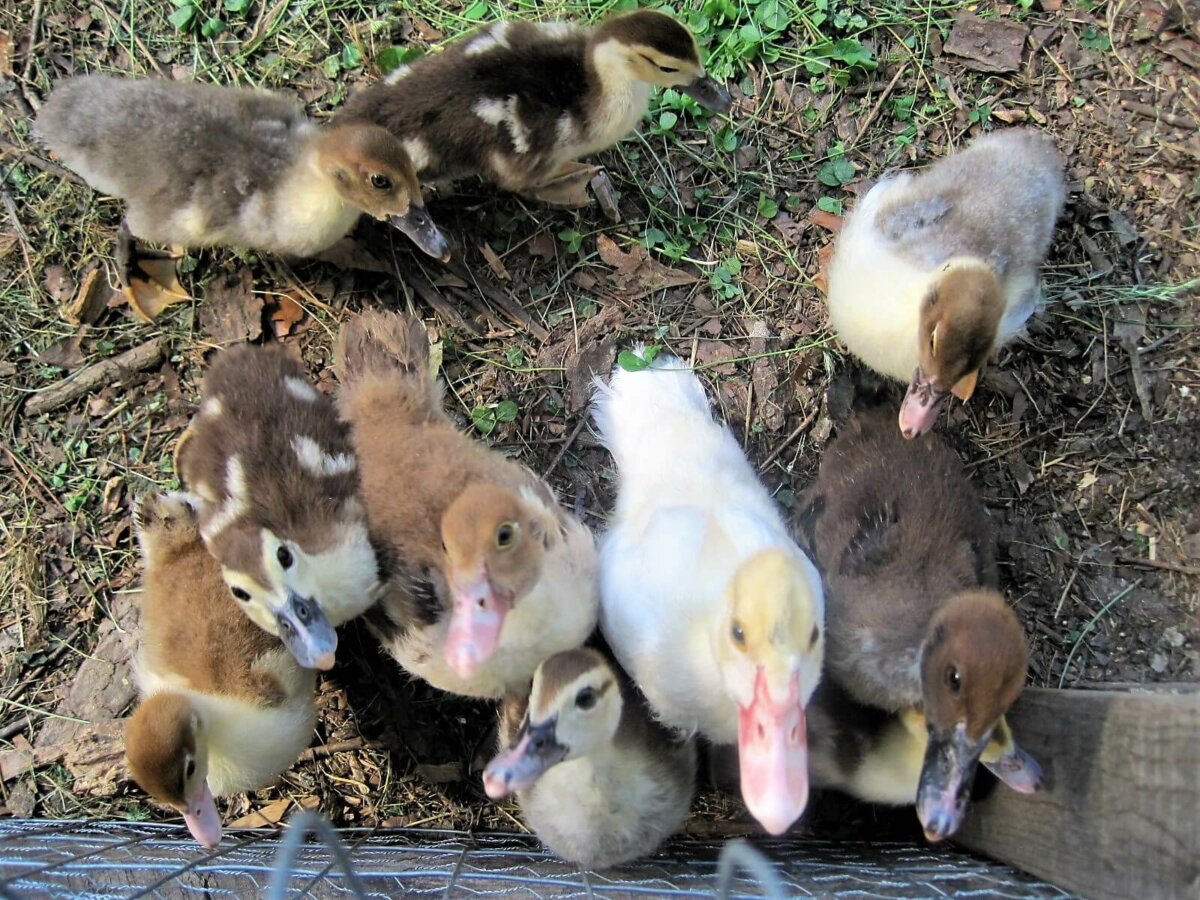
The first consideration should be the time of year that you bring them home. Since Muscovy ducks originated in warmer climates, they are especially sensitive to the cold when young — and if there’s no mama duck to keep them warm, they’ll need to be kept in a warm place at night during the early days.
We handled this by raising our first batch of ducklings in the summer so they could benefit from being outdoors all their lives. You may choose to brood them in the garage with a UV lamp or in the bathtub in the house (if you are alright with cleaning poop out of your house every day).
Once the weather is warm enough at night, around 60 degrees Fahrenheit, or once they are over 8 weeks old, they can stay outside. The big thing to watch for with ducklings is them getting too wet and chilled. Without a mother to clean and waterproof them, they are especially susceptible to getting soaked and dying.
Muscovy Duck Housing
The next thing to have prepared is their housing. Ducklings need good protection from predators, especially at night, but they don’t need anything fancy. I’ve heard of people using a straw-lined dog house with a door, cutting a hole out of a large tub and flipping it upside down, or even just having a safe, penned-in area with a tarp-covered crate to use at night.
If you have a pond, free-ranging ducks may put themselves to bed on logs sticking out of the water or low-hanging branches. Our first Muscovy was not tame in the beginning, wouldn’t come when I called, and spent an entire year sleeping on a tire propped up by the edge of the pond no matter what the weather! She has since gotten used to me, but she showed me just how hardy these ducks can be.
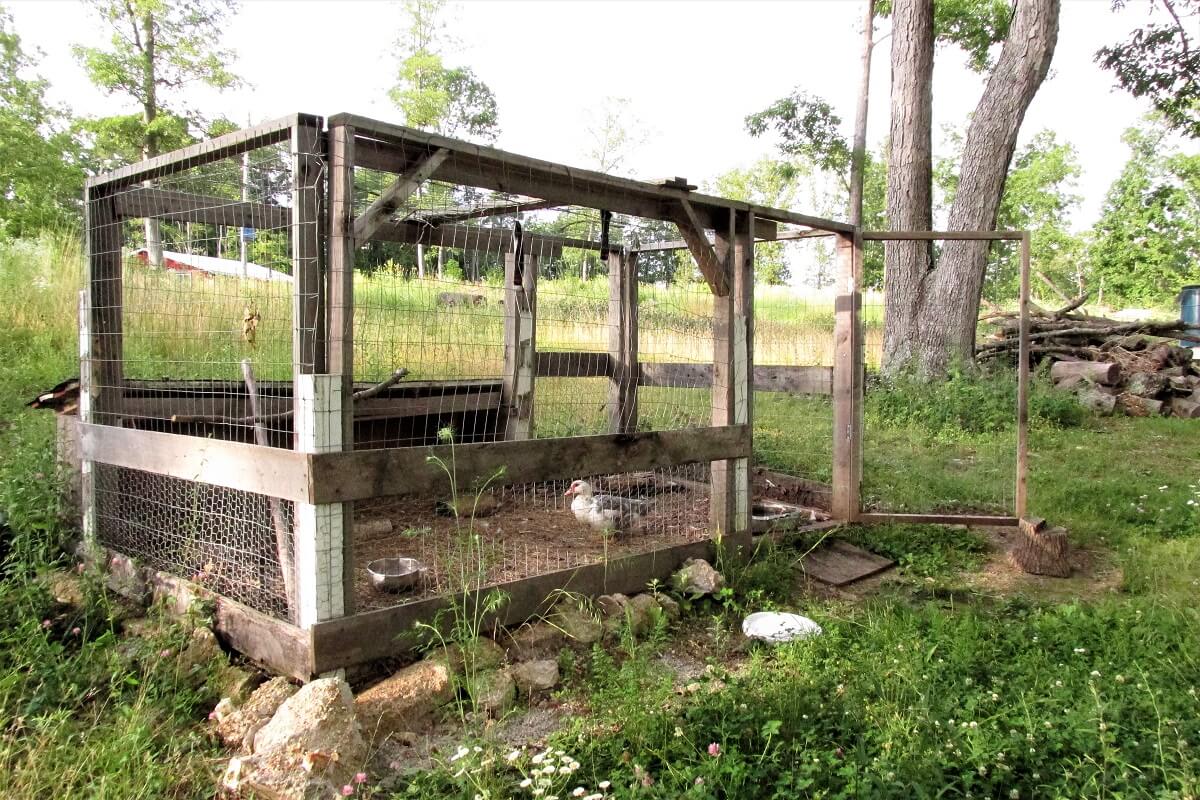
On our homestead, we have a dedicated duck house. As you see in the photo, it is a totally enclosed pen with an overhang shelter on the northern side because that is where most of the bad weather blows. We have problems with roving stray dogs in our area, so having a safe place to shut up our birds gives us peace of mind at night.
We raised our ducklings in this closed space until we decided they were big enough to free range, and then trained them to come back at night. I call them with a special sound just for them and give them seeds as a reward when they return. It may take some herding to get them to get used to the idea, but once they figure out that returning to the duck house means food, they won’t be able to waddle back to you fast enough!
During the summer, they spend most of the long daylight roaming and eating, and I make sure to provide them with clean straw in the covered part of the duck house. As a bonus, this straw doubles as super-fertile garden mulch. In the winter, I layer the straw very deeply in the duck house so that they can nuzzle in and protect their feet from frostbite.
Their warm, protective down takes care of the rest of them. Our Ozark winters often have just a few weeks around the single digits, so I’d be curious to hear the experience from Muscovy-keepers in northern places like Canada!
Food And Water Requirements
When it comes to food and water, Muscovy ducks are relatively simple. You can reference my earlier article on how to feed ducks here, but keep in mind that the needs of Muscovies are even more simple.
Related Post: What Do Ducks Eat?
Our small flock feeds itself entirely from our land. We have a pond teeming with larvae, fields full of clover, mice, and bugs, grit in abundance, and worms and slugs after every rainstorm. On the rare days when we travel and I have to keep them cooped up while we’re gone, I provide a pan full of whole seeds and a huge bucket full of grass and weeds torn up from the surrounding area.
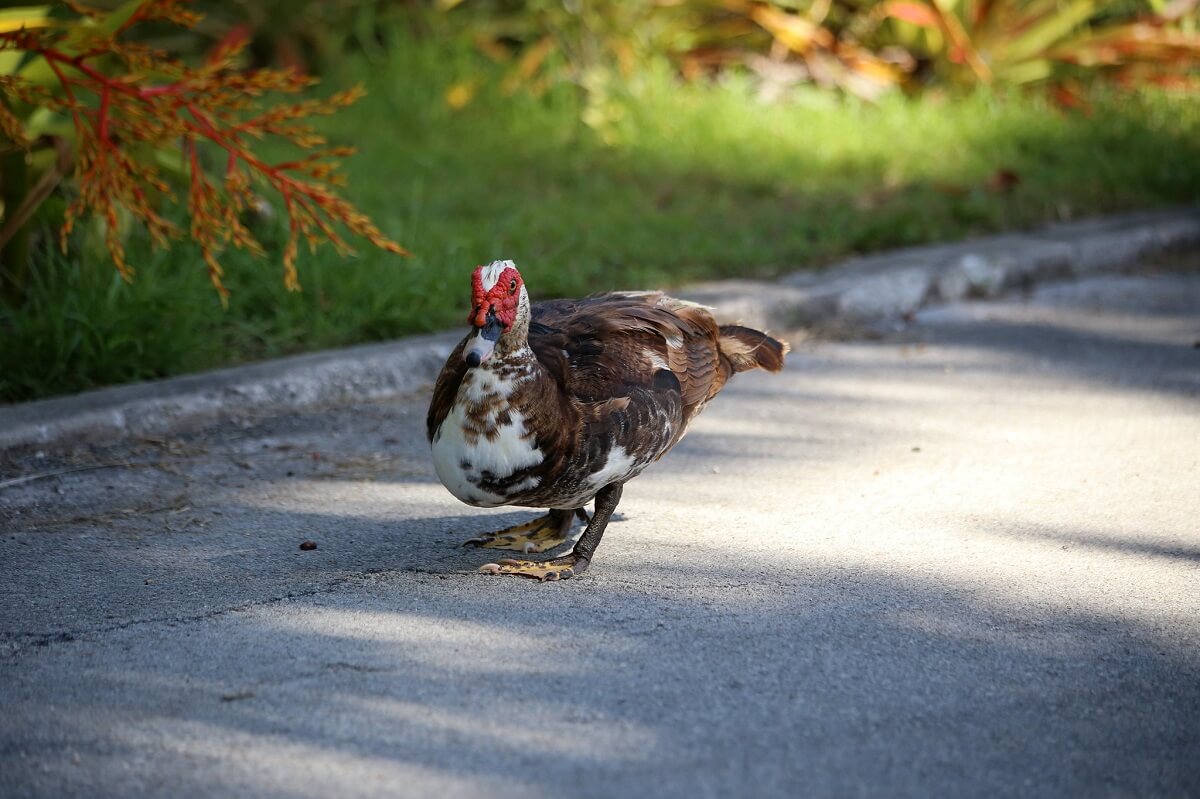
Muscovy ducks aren’t nearly as wild about water as mallard-derived breeds, but they still need plenty of clean water daily. Give them a pan deep enough that they can clean their whole face in it, but rest easy that they’ll leave it a lot cleaner than a Pekin or Appleyard duck. They will absolutely delight in a pond if you have one, but a kiddie pool where they can clean themselves and play is also sufficient.
How To Sex Muscovy Ducks
As they grow, you will find that there are some subtle ways to sex your growing ducks. In my experience, the females grow their adult wing feathers much faster than the males, even though the males may grow larger, body-wise, than the females. Though the male caruncles are much more prominent than the females, they take some time to develop.
Related Post: Raising Baby Chicks: A Guide For First-Time “Parents”
I have found the most surefire way of sexing Muscovy ducks is to listen to the sounds they make. At some point, they’ll stop their cute baby peeps and start making more adult sounds — the females will make those sweet musical trills, and your males will suddenly declare themselves by inexplicably huffing and puffing.
Potential Problems And Diseases
Muscovy ducks aren’t very disease-prone. I suspect it is because they are a little closer to their wild roots than other domesticated ducks. The biggest problems I’ve ever faced with our flock have always been cold-related.
I learned the hard way about motherless ducklings getting chilled. We once lost two ducklings after a hard rainstorm because I didn’t dry them off in time, and I’m much more careful now!
6 Reasons Why I Love Muscovy Ducks
Once you get your ducklings raised, I think you’ll be amazed by how useful and hilarious these ducks can be. Every duck breed has its fans, and I am unabashedly in Team Muscovy. These are the pros to this breed that have unendingly benefited my homestead.
1. Pest Control
The first night you let your ducklings out, you may notice that they are bug-hunting machines. Muscovy ducks are superb hunters, able to nab flies and mosquitoes straight from the air, constantly ruffling through the grass for crickets and other bugs, and even taking out any mouse they find. I would keep this breed for its fly-controlling abilities alone!
2. Good For Free Ranging
The main reason we got rid of our first mallard-derived flock was because they developed a bad habit of wandering far and wide. With a pretty high-use road bordering our land and neighbors that we really wanted to respect, ducks that weren’t content to stay on our 12 acres just weren’t an option. Our Muscovy ducks have been far more content to stay home, and we’ve never had a problem with them leaving.
3. Less Mess
I find that they create far less mud-mess than mallard-derived ducks. My earlier flock of Pekins, Runners, and Cayugas would create boggy puddles in the yard after every rain — destroying patches of ground — but my Muscovies politely sip up the water that they find and then move on.
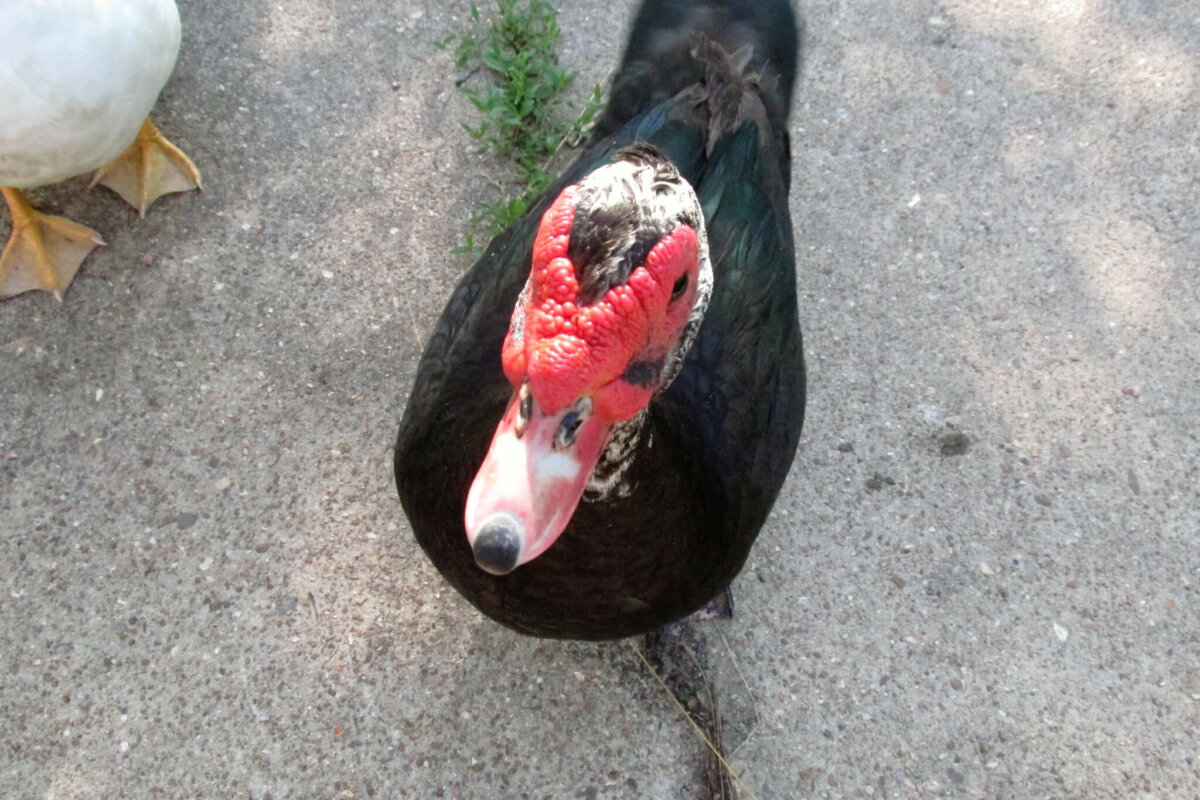
Additionally, they don’t gunk up their waterers either — I only have to fill it once a day. I sometimes replaced my mallard flock’s water four times a day because it was so filthy. When you get all your water from rain catchment or a hand-pump like we do on our off-grid homestead, saving that much water really makes a difference.
4. Super-Jumbo Eggs
Muscovies don’t lay year-round, but when they get going in the spring, they can provide you with dozens of absolutely huge eggs. One healthy, well-fed hen can usually produce 150 eggs a year.
The eggs are excellent in baked goods. I usually use one Muscovy egg in place of two or three of my chicken eggs. They normally lay their eggs in the early morning, so cooping them up in a duck house at night could make your egg hunt a lot easier.
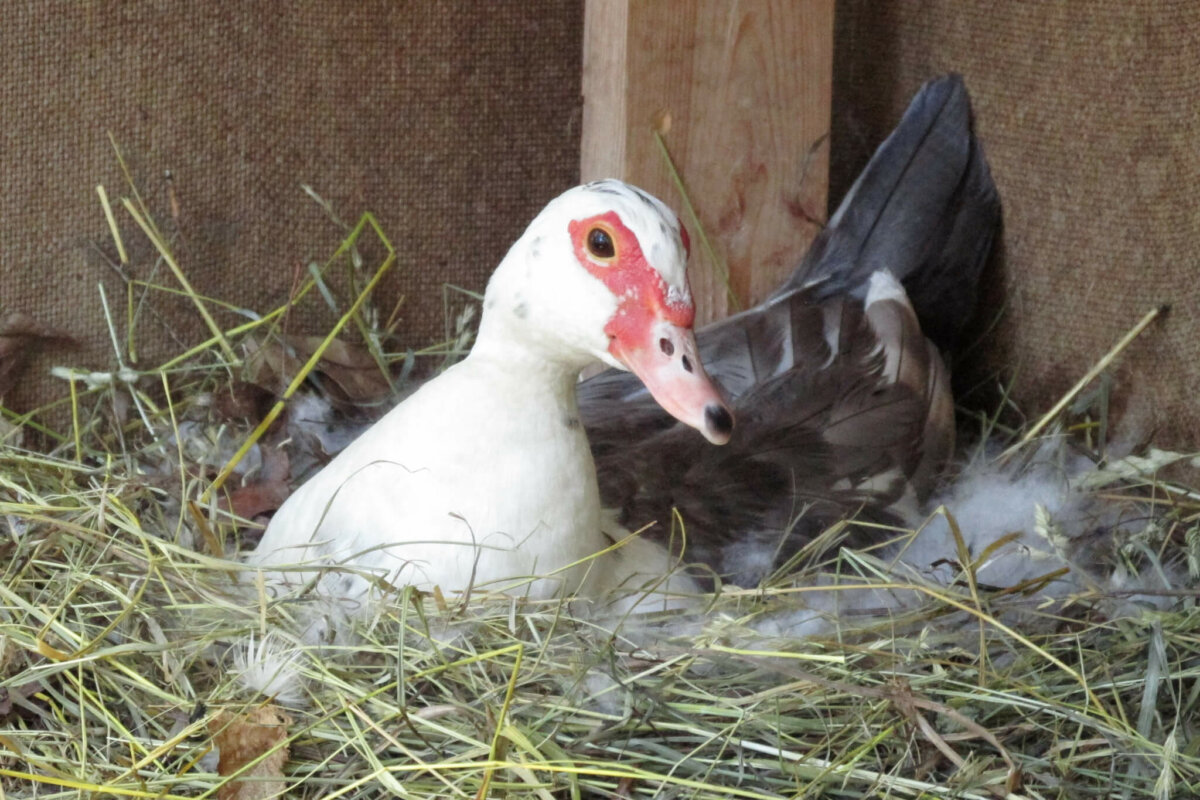
Additionally, Muscovy hens haven’t lost their good mothering instincts. If you let them pile up enough eggs in a nest — usually 8 to 12 — she’ll incubate them faithfully and rear them kindly.
Keep in mind that Muscovy ducks take far longer than chickens to hatch — somewhere around 35 days. The only issue you may face is figuring out where the nest is. I like to encourage duck-house nesting by piling lots of clean, fragrant hay in the quietest corner.
5. Delicious Meat
I can’t speak from experience on this one, but Muscovy meat is supposed to be excellent. Some compare the lean, flavorful breast meat to veal or a sirloin steak.
6. Just Plain Fun!
Muscovy ducks waggle their tails like dogs when they’re happy to see you. I can’t ever get over that delightful fact. The sight of our small flock meandering through the clover, nabbing endless bugs, brings me a quiet joy every day. I love watching our grey-backed hen incubate eggs so tenderly, or laughing at our iridescent brown male as he huffs around my feet begging for treats. I can’t imagine our homestead without them.
So, even though there are “prettier” birds out there, would you be willing to accept a red-warted face in exchange for the most hassle-free, beneficial poultry you’ve ever kept? What’s your take on these not-duck ducks? I’d love to hear your thoughts and stories below.


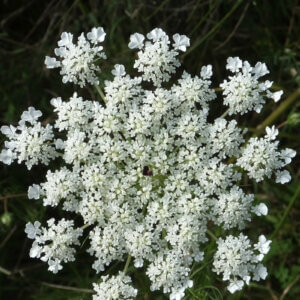
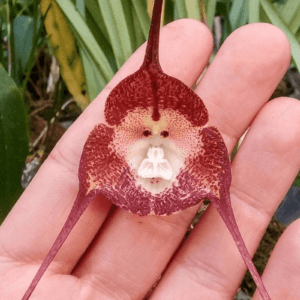

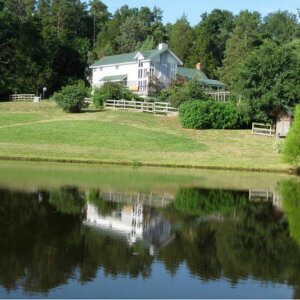




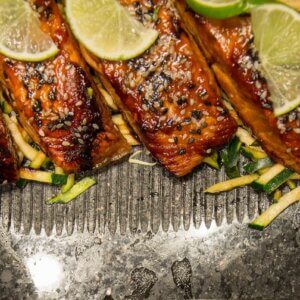
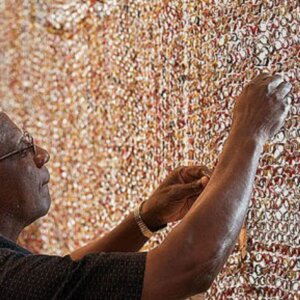

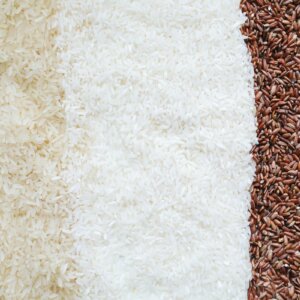
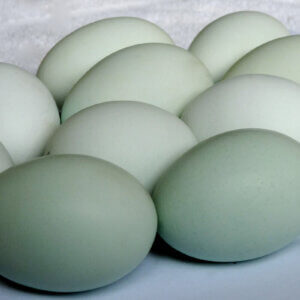


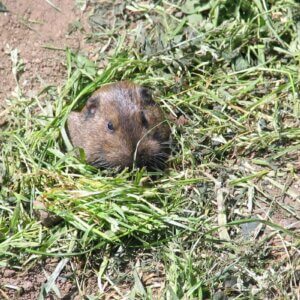
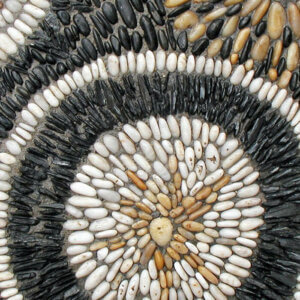

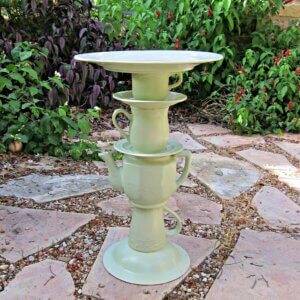
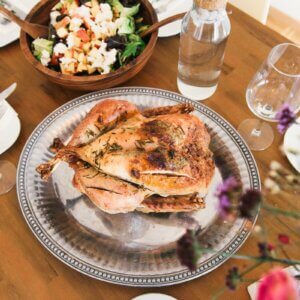

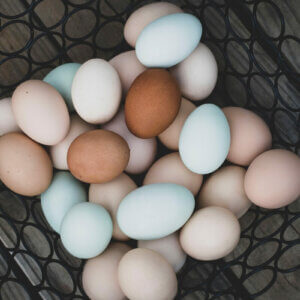

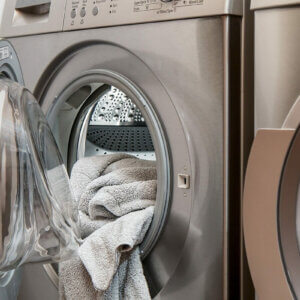



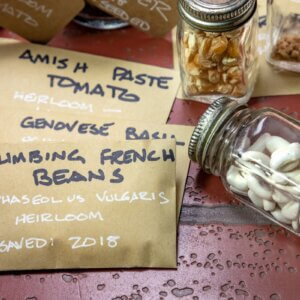

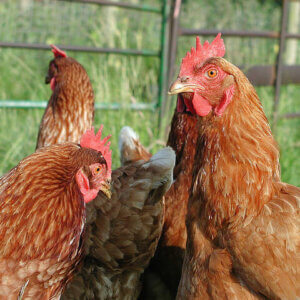
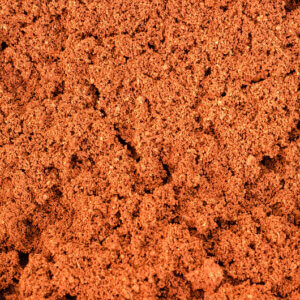
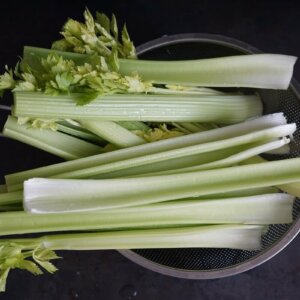
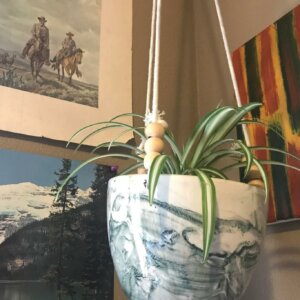


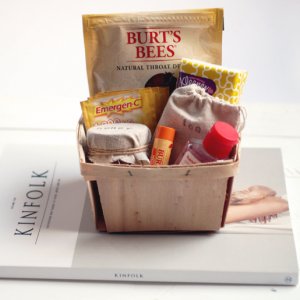

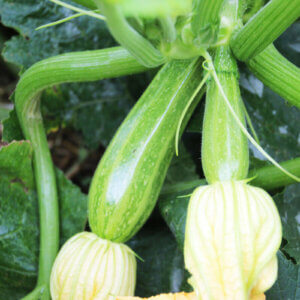

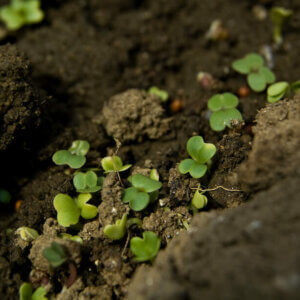
Hi
I was fascinated by your email about the Muscovy Ducks
I am from South Africa
I was wondering if this kind of Ducks would be available here or how I would be able to breed them
We live on a small holding which we indeed want to be off the grid
It seems we can learn a lot from you
Alta
Thanks so much for your comment, Alta! I’m not sure what the availability of Muscovy ducks is in South Africa–I’m sure some quick Google searches will find you more local information. But what I can tell you is that you won’t need to know much specialist information about how to breed these wonderful ducks–they’ll take care of it themselves, for the most part! We just had a brood of ducklings hatch the other day (the grey-backed duck on the nest in the photos in this article is the Momma, incidentally!). She built the nest, laid the eggs, guarded them, and incubated them all without interference—all I did was provide the clean straw in the duck house and close her in at night so that she would be safe.
Really, all you need to get started is a male, at least two females, plenty of water, and a safe place for them at night. They are wonderful animals–I hope it works out for you!
We recently inherited a stray Muscovy duck! He is all alone. We have a big acre size pond. He follows me around and wags his tail for me all the time. We just don’t know where he came from and if he is missing his family. Are they OK alone? He seems happy and content. We live in South Mississippi
Hi Alta, I’m from Lesotho and we get muscovies from SA, so you’ll definitely be able to find them.
have you gotten any Muscovy ducks yet
I’ve seen these ducks raised in dessert areas but you have to have a pool of water
barwickraymond@gmail.com
In South Africa they are called Makoue.
Photo/Attachment:
This is Penguin, a muscovy that has been a stray for years. Her sad story is that she and her 4 siblings escaped from their previous owners house and started living by the river. The owner never bothered to come retrieve his birds (so if you ask me they were technically dumped). I moved into this town 3 years ago, to see these birds keep getting hit by cars, then wander around with broken legs or wings and then disappear all together (you know what that means) and even kicked by kids at the park. I’d always yell at the kids and their parents that there’s no need to be so evil that you hurt an innocent animal for fun that only walks up to you because it’s hoping for some food.
On my way home from work just two days ago, I saw Penguin getting hit by a car and the poor thing was trying to scramble away from the road while tripping over her own broken wing… Needless to say I managed to catch her and take her to the vet to treat her and keep her as a much loved pet forever. If I find any of the remaining siblings I will catch them too, after watching them all die one by one I have a bad feeling Penguin was the only one left… Either way she’s going to have the BEST life she could ever ask for with me ?
Glad you caught her–Muscovys can be difficult to catch when they’re scared! Even with her wing in the cast, she’s cute. 🙂 Strays are always a heartbreak to me–their struggles are so unnecessary, since they are usually the result of people being irresponsible. I do hope you can find a sibling or get a friend–ducks are social and do best when they’re with at least one other. Hope the journey is an adventure for both of you!
God Bless you Maria!!! I am so thankful to our heavenly Father that there are kind hearts like you out there for these sweet creatures that God has chosen to bless us with!
Hi. I am raising a Muskovy ducklings that is approximately seven days old. I’ve had it for two. Been reading a lot about how to raise them. Is there any hope of returning it to the wild at age 8 weeks?
Question, are you in northern South America where these are native? If not, they are probably an invasive species and absolutely should NOT be released. Eat them once they are large enough. Even if you are in their native range, introducing domesticated ducks into a wild population is usually considered genetically bad practice. Wild Muscovy have all black plumage.
I have a single drake free ranging with 11 chickens. My neighbour’s dogs got my bunny and a chicken before I started letting the duck free range. He chases the neighbour dogs out! He is quite a friendly bird, though not interested in pets or being picked up, he comes when called and happily wags his tail and pants at me in greeting. I’m in central BC, so it can get pretty cold here, down to -25 C at night in winter. On those really cold nights I think I will put the birds in the garage for the night, but otherwise I’ve converted a small shed into a coop and they stay in there overnight pretty happily. We aren’t in freezing temps yet but is isn’t far off and everybody has moulted and is looking very puffy and warm.
Thanks for your comment, Lori! I find the drakes to be so endearing, even though ours has a tendency to try to knock the food bucket out of my hands in the morning. They are not fond of being petted, that’s for sure (which is why I try to pet him anyway, because he gets so offended! Lots of tail-wagging at the indignity of it all.) I’ve heard of drakes body-checking hawks to defend their brood–who knew that you could have one as part of your backyard defense (though that stinks about your neighbor’s dog–hope they took responsibility for the attack).
I hadn’t heard from any Canadian Muscovy-keepers until you! That’s great to know that they do well that far north…because -25 C is COLD. Y’all are much tougher, when it comes to cold, than me!
Hi,
we have wild Muscovy ducks that have claimed our backyard, which has a river running through it, as their home for about 2 years now. We have watched 2 litters? batches? of ducklings go from 13 ducklings down to 0 due to pesky pukekos. the mother nests in our hay sheds till the ducklings hatch which seems like a safe place for them but then once they are hatched she takes them all over the backyard, where there are pukekos and onto the river till eventually, they all die 🙁 ( i don’t want to doubt the mum but she doesn’t seem to be the best mum in the world). So we have just noticed that one of the Muscovy ducks are nesting again, in the hay shed, would it be a good idea to take her in and keep her in an enclosed space so that she is safe and once they do hatch to keep them all there till they are much bigger?. Should we make it so she can’t leave, or when they ducklings hatch, only she can leave? (by flying??) what’s the best way to relocate her and her eggs? just really don’t want to see another batch of ducklings get killed 🙁
thanks, Teresa 🙂
I had to look up what a pukeko was–I’m assuming you’re in New Zealand? Those sound like quite the pest to your wild duck friends!
It is true that some mothers are good, while others seem totally clueless. It could be that your Momma duck just isn’t good at keeping her ducklings watched over! While it is hard to watch, I’m sure, it’s a difficult call to make when you’re dealing with a wild animal. Some would say that it’s just harsh reality taking place in your backyard. :/ I don’t know of any way to safely relocate a Momma and eggs–often, if her eggs are taken, she’ll just start over. And as for enclosing them–ducks really don’t do well when in confinement for a long period.
So, all that said, I think a possible course of action is to relocate Momma and babies a day AFTER they hatch–she’ll stay with the eggs for most of the day until her clutch hatches anyway. Are there farms in your area that raise Muscovy ducks? Perhaps you could find someone interested in taking care of them for the long-term. I hope that at least gives you a start! Let me know how it turns out.
I was given 2 Babies, and 2 fertile Muscovy eggs, Babies were a week old.
I had a Chinese Brown goose that was “sitting” so I snuck the two fertile eggs under her and after 3 weeks, out popped 2 new babies, after several months they had grown substantially. Turns out I had 3 Males and one of the fertile eggs was a lone female. As soon as the hormones kicked in the males ganged up on the female to breed her, ultimately killing her. Now with out the female the two dominant males gang up on the third make, making his poor life Hell.
Watch out for Muscovy’s…
Watch out for Muscovys? I’d say the bigger threat is bad flock management. The drakes aren’t inherently evil–they just don’t want to be a fraternity. I know it’s too late for your poor female, but she had no chance–each male should have at least three females to himself, in an ideal circumstance. I’m not sure if you were asking for my input, but for the sake of your remaining birds, you need to make some sort of change–it would be probably best for everyone involved if you exchanged two of the males for two or three females. It sounds like you haven’t had the best time with these awesome birds–I hope things work out better for you all, Marsha.
What happened has nothing to do with Muscovies and everything to do with the fact that you allowed the sex ratios to be extremely unbalanced. The same thing would have happened regardless of whether they were mallard-based ducks, chickens, turkeys, etc. You are responsible for keeping your flock at a proper ratio. As soon as you realizes that you had 1 female and 3 males, you should have either acquired *many* more females or rehomed/eaten 2 of the 3 males.
This is not just Muscovies. All male ducks are sex-crazed in mating season. At least 3 ducks are needed to one drake for there to be any chance that of peace. We have a white pekin make and once one of the females was killed by a hawk he began to go after our chickens (dangerous for chickens…whole different biology).
I really hope you have learned how to manage a flock since you wrote this. One female to three males is absolutely unacceptable. Please never do that with any kind of ducks or fowl for that matter.
Hello from B.C. Canada. We live in the Thompson Okanagan and love our Muscovy Ducks. They have fared just fine in temps as low as -25 F but we did keep them in their pen for those couple days. But mostly they will stay in after we open their door in the morning if it’s not to their liking for temp. We clip one wing and have found it allows them to fly low to ground still but no runaways. They are curious and very serious helpers when we turn sod in the garden each year. They love worms and cooked white rice with som tiny ham cubes added. That’s their winter protein boost. Lol. They know their names and are great at hiding those eggs. It’s an Easter egg hunt daily. Best if you find a nest to leave a couple eggs and take the rest. Believe us, if you don’t you will suddenly have a flock of 20 some odd ducklings showing up with mom for snacks. ??. All in all they are the best animal we have added to our little hobby farm. We have a flock of 13 females and two males. Have a great day from us to you all.?✌️
This is great! Thanks so much for filling in with some information about Muscovy ducks in Canada. I’ll see if I can add a note in the article. You’re made of sterner stuff than I am–I don’t know what I would do with -25!
So glad to be able to share in our appreciation for these wonderful, personable birds. Have a wonderful spring! We’ll both probably be enjoying some fluffy little babies soon enough. 🙂
Muscovy ducks are great. Probably not a better choice for a productive livestock species for a small homestead. I like the fact that they make excellent natural setters and mothers; duck eggs are hard to hatch in an incubator unless you invest in a really good (and expensive) one. I never let my poultry (other than geese) do much free ranging because there are too many hawks around, but in the summer anyway a Muscovy certainly could subsist on pasture if you can keep the hawks away. But don’t count on being able to let them fend for themselves because of predators. A secure coop and pen is a must for any species of poultry, for nighttime use at the bare minimum. I generally got the best hatches in the spring. The eggs of the second brood get subjected to hot summer temperatures and aren’t as viable.
Thanks for your comment, Jack! I totally agree that these are some of the best livestock for smallholdings in particular. And I do hope I wasn’t unclear in the article–nighttime protection is really important for these wonderful birds. All the same, I often seem to have a duck or two who absolutely REFUSES to come out of the pond at night in the spring–in those situations, I find I have to trust their judgment, because there’s not much I can do about it anyhow, haha.
Thanks for the fascinating information on eggs, by the way! In retrospect, I’ve found that to be true in my experience too. I just had never heard it pointed out.
Hi Wren,
When I had my Muscovies, I also had Rouens and Blue Swedes. I like those two breeds as well. They are both similar in size to a female Muscovy and they too made good setters and mothers. I occasionally ended up with some mule ducks. I actually thought that was kind of cool, something a little bit different. A mule Rouen-Muscovy duckling is easy to identify right off because they have the black eye stripe of a Rouen but the colors aren’t “quite right”… a little hard to describe, but if you have Rouens and Muscovies and one hatches you’ll know it right away. The only drawback to Muscovies is that if you have more than one drake, one may become a merciless bully over the others, even to the death, unless you have a lot of hens. But not always. As far as bullying goes, Chinese geese are the worst. I hatched some Chinese goose eggs under a foster Muscovy mother and even though they were raised around other ducklings since hatching, once they got some size on them they brutally attacked and killed their duckling flock mates. I don’t like that breed for that reason and although I love regular geese (i.e., ones descended from the wild graylag goose), I’ll never get Chinese again. And I’d be wary of Africans. I’ve also read that some rare breeds of geese that were originally bred for fighting have Chinese blood (unlike Muscovies and mallard-type ducks, Chinese-type and graylag-type goose hybrids can be fertile). After my experience with the breed I can see why they’d make good fighters!
GREAT ARTICLE. WELL WRITTEN AND DOCUMENTED. FANTASTIC PHOTOGRAPHY. REAL INTERESTING AND FASCINATING INFORMATIVE FACTS. MARI FERNANDEZ. NATURE TEACHER AND AUTHOR
So glad it could be helpful to you! Thanks for your kind words, Mari.
Hi I have Muscovy’s and love them. Very tame and nice. Unfortunately, I just had 3 hatch eggs all at once! Too many for us. I’ve got a friend who wants 10 I think he will sell or put them on his farm. I’m wondering if it is better to leave a duckling or 2 with each Mom? I only had one other hatch and kept them all . Any advice?
That sounds like a ton of ducklings!! My advice is this: first, keep as many ducklings as you have the resources, desire, and time for, but don’t overthink it. I am assuming that you’re wondering how the females will be affected by having their broods taken away. But you don’t have to worry. Ducks aren’t like people–the females won’t be emotionally compromised when you give the ducklings to your friend. They might fight you when you remove the ducklings (they can be fierce!), but soon enough she’ll return to “normal.” I will say, the longer you leave the ducklings with the mother, the stronger they’ll be before sending them to another farm–if you can wait until they start showing some independence from the mother (usually once they start growing their real feathers), they’ll have their best start. Hope that helps!
I live in south alabama and have raised Muscovy ducks and they are all you say. They are also very good mothers once I watched a hen Muscovy chase off a hawk that was trying to pick off some of her 12 fluffy yellow ducklings. They are very amusing and we would often see ours standing 4-5 in a circle hissing to one another. I was certain they were talking about their day. We started with 5 or 6 and they quickly made 30 then 60. We wer butchering them and giving them away. We moved and don’t have any right now but will Soon as we just finished an acre pond on the 12 acre site. I won’t butcher any more as after doing it once it’s just too heartbreaking, they understand what is happening and will huddle around their doomed friends in the pen. I thought they were messy and pooped more than any other animal but after hearing about other ducks. I may steer away from the Welch harlequins I was considering. Thanks for the great article.
I have 4 Muscovy hens that are great. They have started laying for the spring. My question is I want to get some ducks that are better layers like pekins or khaki campbells and would my hens raise the babies?
can I keep a lone male with a flock of 7 chickens? (all hens) My ex asked me to foster him after his two females were eaten by racoons after my ex removed eggs from the clutch and the females started hiding eggs. He’s just been here 3 days but wanders around alone since the chickens avoid him so far. I’m hoping he will acclimate and am wondering if I should get him a mate, rehome him to a big flock, or wait and he will acclimate the way he is.
A drake can injure or kill chickens if he tries to mate with them. Best to either get a rooster to protect them, or get some ducks for the drake.
I just got two muscovies from a friend and I am sure what sex they are yet. If they are a male and a female, would you recommend that I exchange one so that they are both the same? Or is it ok to keep one male and one female?
I just brought home 3 female Mucovys yesterday. They quickly found our stock pond at the back of our property. They tried to befriend our goats, but the goats aren’t sure yet. I love their hardiness and their personalities. So glad we got them.
Question, my coop is in the corner of my barn the opening would be 4 feet above the floor with a 18″ ledge before they would be able to get outside. I know they are able to fly up there, but would they, to get outside to a run? I know the chickens do.
We have been raising muscovy ducks in my family since I was very little, I am their biggest fan. They are so fun and easy to raise, practicaly disease free and the eggs are delicious. You are totally right, they are social creatures, the funniest thing to me is how they gather round in the evenings in a semi-circle, wag their tails and shake their heads, hissing. It’s like they gossip all the latest trends or discuss politics with such high intensity, one might think they do have all of it figured out, if only they would speak human.
Please what breed are these ducks ,the white one is a male and the black is female.
She just started laying eggs recently laid 6 and moved somewhere else to lay 1,she doesn’t cover the eggs and I don’t know if the eggs are fertilized,will they hatch?
Please I have a male and female duck I don’t know the breed couldn’t upload the pictures but the female is laying eggs already she started laying eggs few days ago she laid 6 eggs and laid 1 somewhere else but she is not covering them. I don’t know if there is a way I can upload images
We have Wild Muskovy ducks And I am in love with this breed they’re like dog ducks.
We have wild Madison our backyard Every day we live on a canal in Pensacola would it be OK if I had free range in my smaller backyard? I guess I’m worried about them interacting or maybe mating with wild ones Should I consider a different duck or maybe you keep them in A pen all the time?